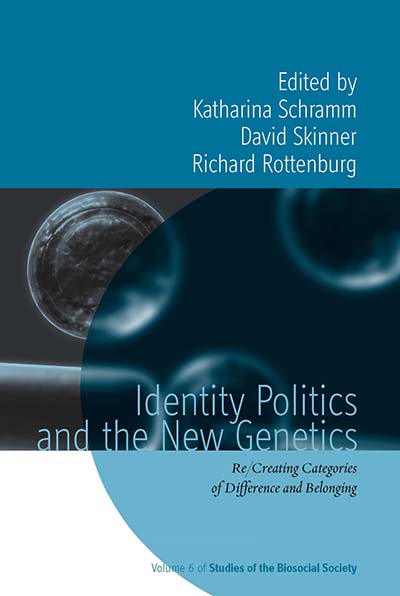Identity Politics and the New Genetics: Re/Creating Categories of Difference and Belonging
Berghahn Books
January 2012
226 pages
tables & figs, bibliog., index
Hardback ISBN: 978-0-85745-253-5
Edited by:
Katharina Schramm, Senior Lecturer of Social Anthropology
Martin-Luther-University Halle-Wittenberg
David Skinner, Reader in Sociology
Anglia Ruskin University, United Kingdom
Richard Rottenburg, Professor Social Anthropology
Martin-Luther-University Halle-Wittenberg
Racial and ethnic categories have appeared in recent scientific work in novel ways and in relation to a variety of disciplines: medicine, forensics, population genetics and also developments in popular genealogy. Once again, biology is foregrounded in the discussion of human identity. Of particular importance is the preoccupation with origins and personal discovery and the increasing use of racial and ethnic categories in social policy. This new genetic knowledge, expressed in technology and practice, has the potential to disrupt how race and ethnicity are debated, managed and lived. As such, this volume investigates the ways in which existing social categories are both maintained and transformed at the intersection of the natural (sciences) and the cultural (politics). The contributors include medical researchers, anthropologists, historians of science and sociologists of race relations; together, they explore the new and challenging landscape where biology becomes the stuff of identity.
Contents
- List of Illustrations and Tables
- Acknowledgments
- Introduction: Ideas in Motion: Making Sense of Identity After DNA; Katharina Schramm, David Skinner, Richard Rottenburg
- Chapter 1. ‘Race’ as a Social Construction in Genetics; Andrew Smart, Richard Tutton, Paul Martin, George Ellison
- Chapter 2. Mobile Identities and Fixed Categories: Forensic DNA and the Politics of Racialised Data; David Skinner
- Chapter 3. Race, Kinship and the Ambivalence of Identity; Peter Wade
- Chapter 4. Identity, DNA, and the State in Post-Dictatorship Argentina; Noa Vaisman
- Chapter 5. ‘Do You Have Celtic, Jewish, Germanic Roots?’ – Applied Swiss History Before and After DNA; Marianne Sommer
- Chapter 6. Irish DNA: Making Connections and Making Distinctions in Y-Chromosome Surname Studies; Catherine Nash
- Chapter 7. Genomics en route: Ancestry, Heritage, and the Politics of Identity Across the Black Atlantic; Katharina Schramm
- Chapter 8. Biotechnological Cults of Affliction? Race, Rationality, and Enchantment in Personal Genomic Histories; Stephan Palmié
- Notes on Contributors
- Bibliography
- Index
